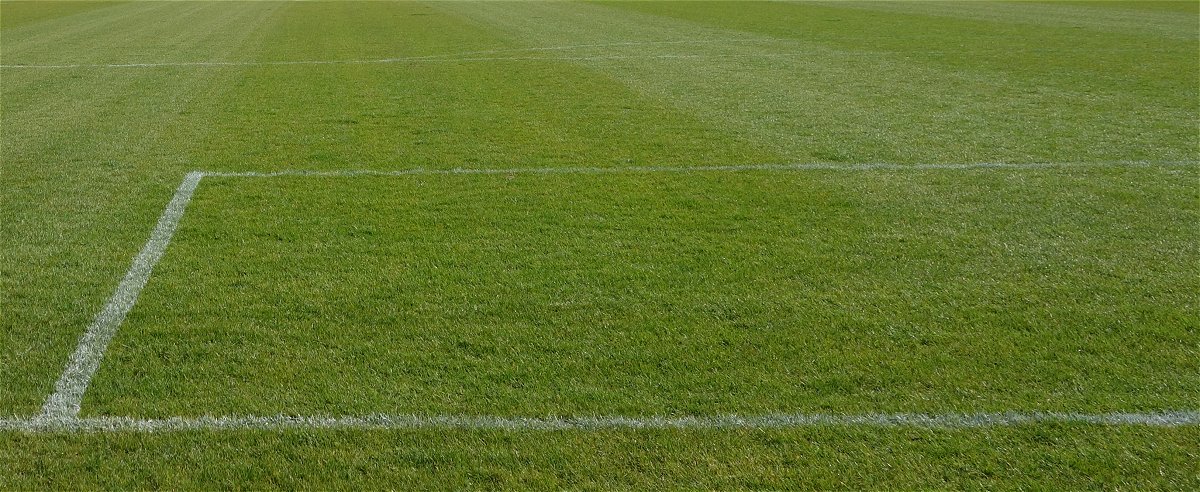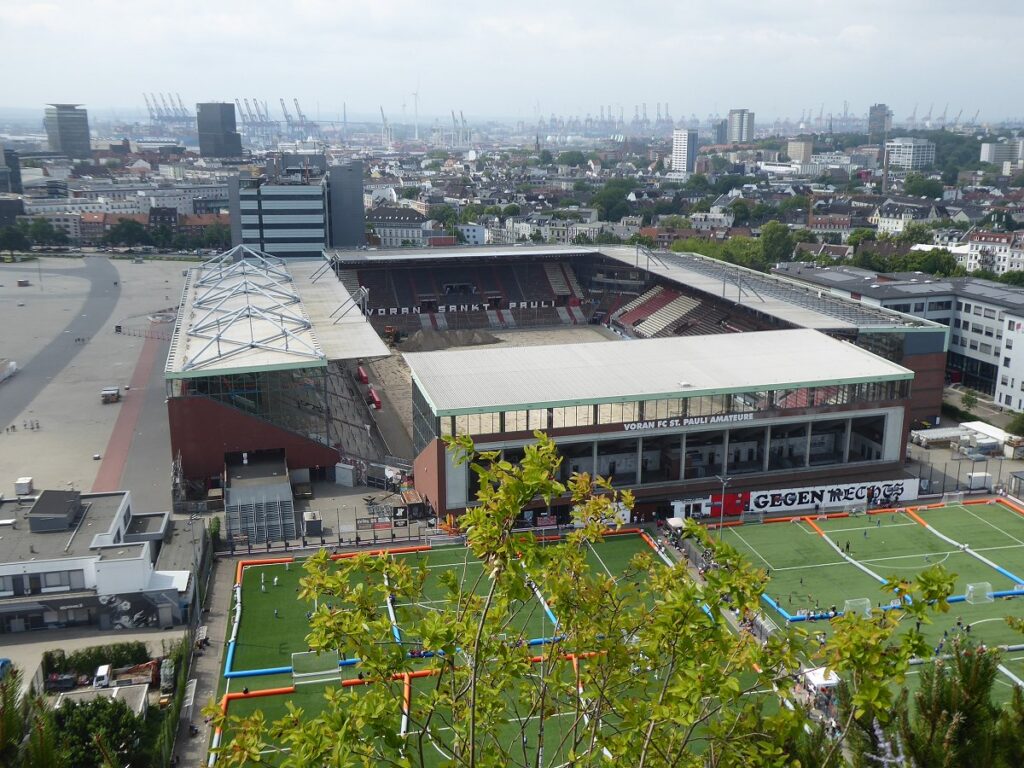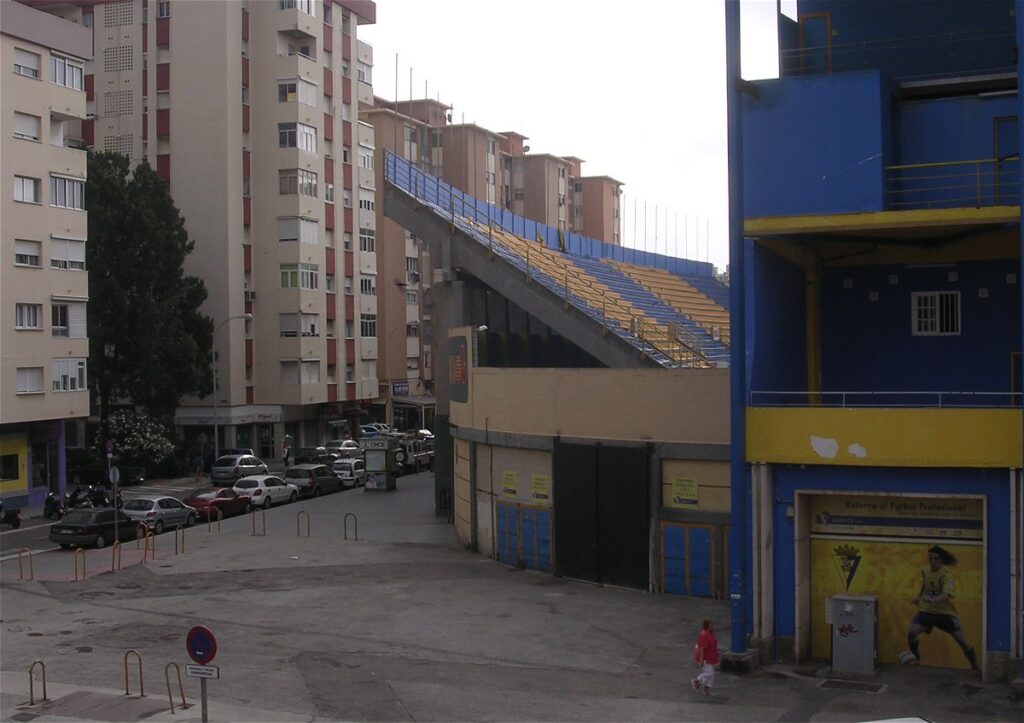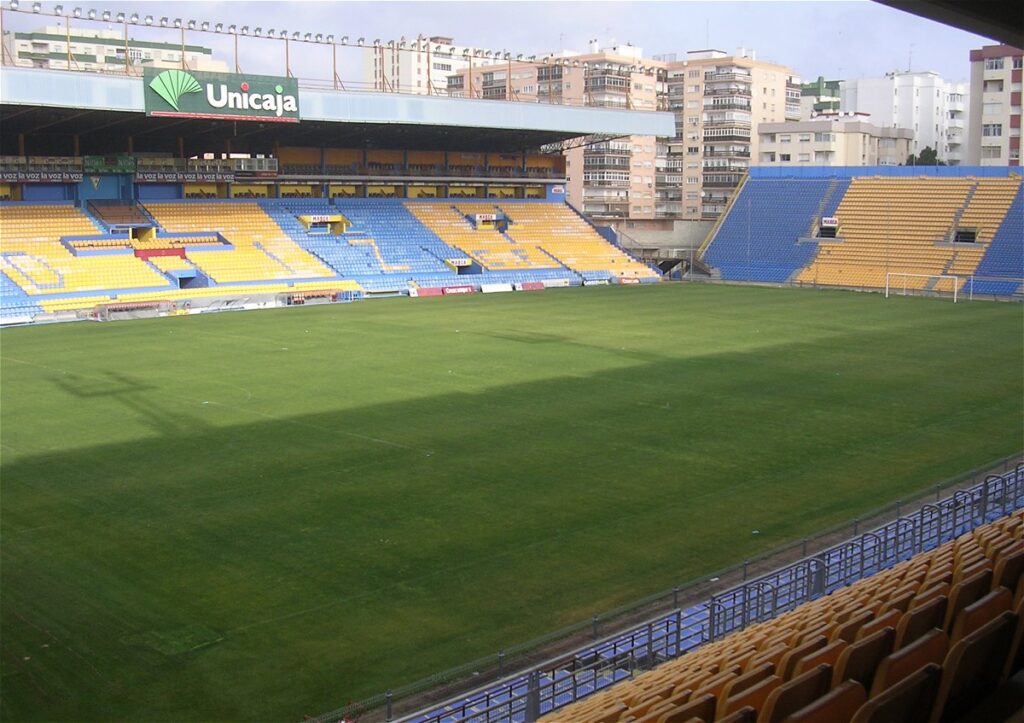Roaring Red Front
Historian Wim Bot is a prominent expert of the Dutch Cyclists’ Union (Fietsersbond). He is also known as the ‘football professor’ of Feyenoord, the big club of the port city of Rotterdam. In his book review he recounts the experiences of two British authors and their travels along a series of football fields, sometimes discovering clubs that withdraw from the hyper-commercial global football/soccer that is ruled by big money. A club like St Pauli in Hamburg (Germany) turns out to be an example of empowerment by local, place-based communities that forge alternative social, cultural and economic ties.

Real left-wing football clubs? A journey of discovery, from St Pauli and Liverpool to Boca Juniors
By Wim Bot (January 2025)
During my most recent football trip to England I had time to visit the left-wing bookshop Housemans in London, a shop where you feel like you are back in the late bookshops like the famous Rooie Rat (the ‘Red Rat’, Utrecht, Netherlands). There in London I noticed the book ‘The roaring red front. The world’s top left-wing football clubs’ by Stewart McGill and Vincent Raison. As a left-wing Feyenoord fan and football lover I obviously could not pass it up.
The authors are British football fans, outspokenly left-wing and critical of the often racist nature of British professional football. For them, being a supporter of a club is a collective experience, the stadium is one of the few places in society where people can still have such an experience. After a visit to St Pauli, the Hamburg club that is seen all over the world as the example of a left-wing club, they decided to visit more clubs with a progressive profile and write about them. The supporters of the eleven clubs to whom they devote a chapter in the book are quite different, but the greatest common denominator is an egalitarian, anti-racist and anti-fascist identity and opposition to the commercialisation of football.
- Image: Axel Kuehn – Hamburg, 2025
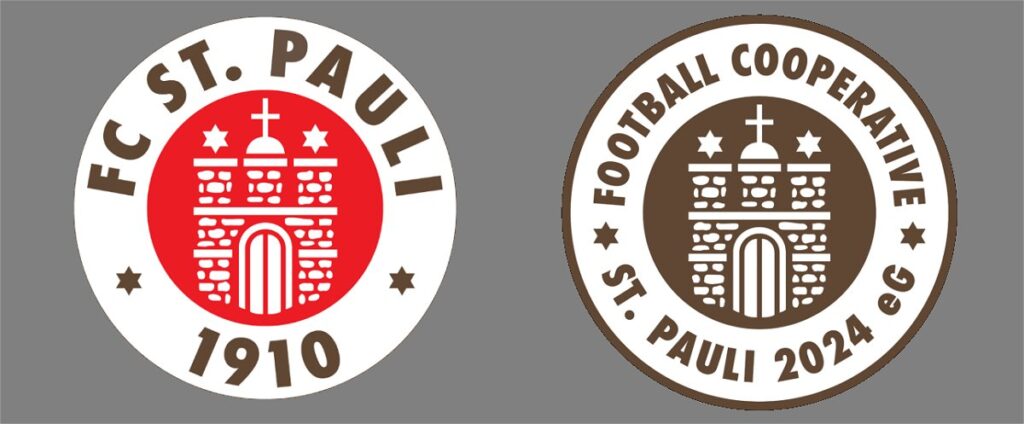
St Pauli became popular as a reaction to the influence of the far right at HSV (the big old ‘Hamburger Sport-Verein’) and developed into the rallying point and symbol of the Hamburg alternative scene, playing in the Bundesliga for the second time this season (2024-2025). The club management has turned it into a progressive business model, without selling out its own identity.
Smaller clubs such as Red Star from Paris (or rather Saint-Ouen) and Dulwich Hamlet from London represent a similar kind of progressive alternative. Cadiz and Rayo Vallecano from Spain and Cosenza from Italy are less outspoken as clubs and mainly have a fanatical following from their own city or neighbourhood, with a strong collective identity.
As one of the biggest clubs in the world, Liverpool has a distinct character: that of the working class from a port city, with a strong Irish influence and its own dialect, pro-Labour and anti-Thatcher, anti-Tory and anti-tabloid The SUN. Legendary 1960s manager Bill Shankly explained how he saw socialism in society and in football: working together, helping each other and being rewarded for it, “that seems like a lot to ask, but that’s how I see football and life”.
Boca Juniors from Buenos Aires is a kind of Argentine counterpart to Liverpool, but with Peronism as a connecting element instead of Labour. A very special club in the book is Palestino from Chile, founded by the large Palestinian community in Chile – half a million people from Palestine settled in Chile from 1850 – and playing in Palestinian colours.
The authors are not blind to the dark sides of the ultra culture they describe. These groups are sometimes also violent and hostile towards outsiders. The clubs they describe all have their own history and identity and cannot be tarred with the same brush. They do show that in a world in which football culture is becoming increasingly commercial and uniform, there are places where fans are able to maintain and/or build their own collective and non-discriminatory culture.
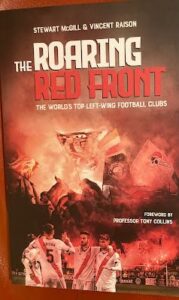
Book:
Stewart McGill en Vincent Raison, The Roaring Red Front. The World’s Top Left-wing Football Clubs. Pitch Publishing, ISBN 9781801501446.
Text: Wim Bot
Translation & editing: Favas.net
Images Cadiz (2006) & Hamburg (2025): Axel Kuehn
Other images: Favas.net
St. Pauli logos:
https://www.fcstpauli.com/
https://fcspeg.com/
About collective and non-discriminatory football culture. This report was published earlier in Dutch on ‘Linksbuiten’ Wimbot.blogspot.com/ (January 27, 2025).
Other reports of Wim Bot at Favas.net:
Our House in Ghent – About hope for a better world from old socialists to young climate activists.
And more to come …
COMMENTS
Wim Bot (April 6, 2025)
Nice news:
https://www.espn.com/soccer/story/_/id/44495704/st-pauli-fans-pay-29-million-buy-majority-stake-stadium
Rob van der Bijl (March 7, 2025)
In The Guardian: More on the change in football, eight years ago but still applicable (according to Axel Kuehn)
https://www.theguardian.com/football/2016/sep/17/football-fans-stadium-gentrification
Fava Eds (March 1, 2025)
Favas.net received a nice comment from football connoisseur Les Herbert (Romsey, UK). We are glad we could bring in his commentary for him.
‘In the UK the football support tends to reflect the political views in the area. Much the same everywhere in the world I suppose. The Liverpool example is an extreme example but you won`t find much Tory support in Manchester or Newcastle.
The London clubs are slightly different and West Ham is a case in point. The club began as “Thames Ironworks” and certainly until the 1970s the support and indeed the players were solidly working class and local. By that time the old East End had begun to move out towards Essex to New Towns like Harlow and Basildon. When Thatcher came along the politics in Essex shifted to the “yuppie” culture as many of the younger generation worked in the City and a voter type known as “Basildon Man” was seen as important by Tory and Labour alike. You might have to look some of this up as it is tricky to explain briefly. Essex is still where the majority of the fans live. Meanwhile the club had gone through some financial difficulties and we ended up with the current owners who see the club as a business. Some (including me) see the move away from the Boleyn Ground as the end of the West Ham we were brought up with.’
Thanks Les for your history on West Ham. You may know this article from Soccer Bible:
https://www.soccerbible.com/design/residence/residence-1-boleyn-ground-west-ham-united/
- Images: Axel Kuehn
- Cadiz, 2006
Fava Eds (February 19, 2025)
Thanks Axel, for your very nice pictures (with credits in the main text now). It’s incredible how close the football spectators are to the facades of residential buildings.
Axel Kuehn (February 19, 2025)
Interesting! I know why I like St. Pauli – at least as long they don’t play against my home team KSC 🙂 (Fava Eds: ‘Karlsruher Sport Club’). There are various examples for bigger cities which have a dominating big club and a smaller one which, however, may own more sympathy, at least by those with a certain “underdog” attitude. OK, underdog attitude must not always pair with left political views – in Hamburg and for St. Pauli it does. Berlin is also interesting: here Union Berlin, the East Berlin club, has now taken the lead and the former big team Hertha, from the West, is behind. Also Union Berlin is at least a club with some specific culture and the “Alte Försterei” ground relates to it. Where supporters are located politically is more difficult to judge as for St. Pauli. Nice to see Cadiz mentioned.
I had the opportunity to pass by their football ground some years ago (2006) and admired the close neighbourhood between housing areas and the stadium which allows people to watch matches from the windows of their flats. I like that but more and more football grounds of this genre are nowadays moved somewhere in the outskirts. This means unfortunately replacing close links to local residents by a better “commercial environment” – serving different people at the end. Modern times – enjoy old ones with some Cadiz pics.

